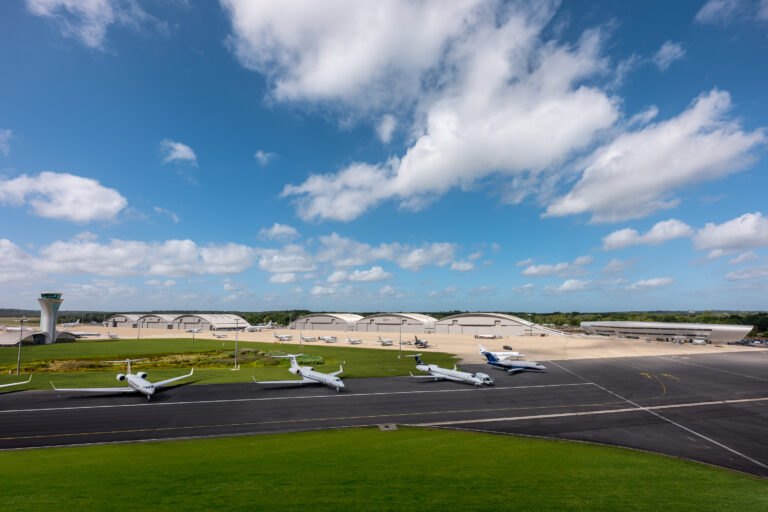Farnborough Airport has launched consultation on a revised planning application that maintains the existing 50,000 annual flight limit while increasing non-weekday flight capacity.
The airport submitted an original planning application in 2023 seeking to increase total annual flights from 50,000 to 70,000 and non-weekday flights from 8,900 to 18,900. The revised application proposes increasing non-weekday flights to 13,500 annually while keeping the overall 50,000 flight limit unchanged.
The revised application retains existing restrictions on heavier aircraft, including an 80-tonne maximum weight limit and no more than 1,500 annual flights for aircraft weighing 50-80 tonnes. Non-weekday flights for heavier aircraft would increase from 270 to 405 annually, proportionate to the overall non-weekday flight increase.
According to Farnborough Airport, the application proposes removing aircraft weighing 50-55 tonnes that meet stringent noise standards from restricted weight category quotas. The change supports introduction of modern aircraft with improved environmental performance compared to older, lighter aircraft.
Simon Geere, chief executive of Farnborough Airport, said the revised application addresses medium-term growth without compromising long-term planning. “Supporting the long-term demand for flights from Farnborough Airport is essential if we are to maintain our role as one of the principle economic generators in the region,” Geere said. “The airport supports over 3,000 local jobs and is the UK’s largest business aviation gateway serving London and the South East.”
The revised application does not include changes to operating hours, which run from 08:00 to 20:00 on non-weekdays. The original application proposed extending hours from 07:00 to 21:00, but this was removed following consultation feedback.
Farnborough Airport has opened public consultation on the revised application until October 22. The airport will host two online webinars during the consultation period for community questions and feedback.
According to the airport, approximately 80% of flights are business-related, contributing £1.6 billion in gross value added to the UK economy annually. The facility supports 3,100 local jobs across hundreds of businesses in the region.
Farnborough Airport has committed to achieving net-zero emissions for operations under its control by 2030. The airport signed an agreement in March with Hydrogen Refinery to secure 12.5 million liters (10,000 tonnes) of sustainable aviation fuel annually, derived from waste materials using carbon-negative technology.





